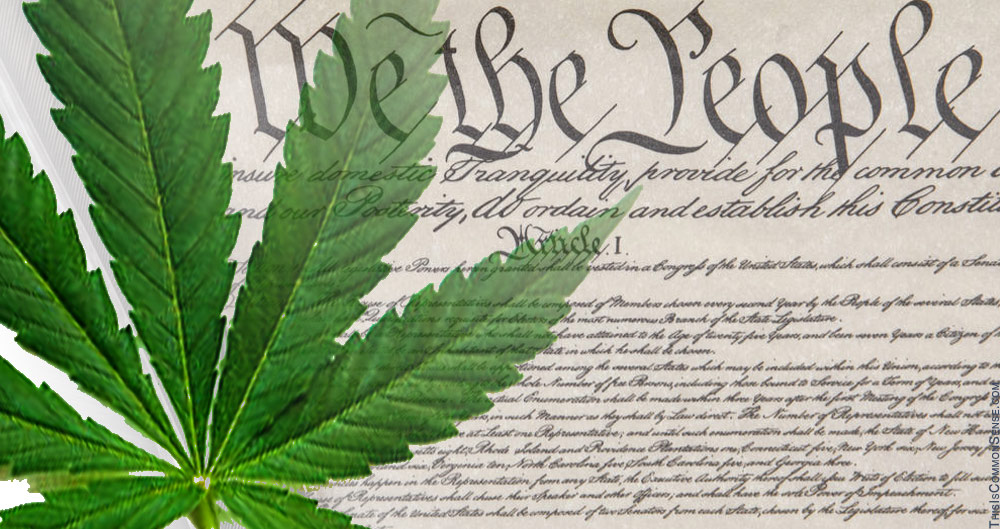When Attorney General Jeff Sessions rescinded the Obama Administration enforcement guidelines regarding the states that have legalized (in their 29 different ways) marijuana, last week, supporters of freedom expressed some worry.
But we had to admit, one excuse for Sessions’s nixing of the mostly hands-off policy seemed to make sense on purely legal grounds. If we want to liberalize drug laws, then our Cowardly Congress should do it.
Definitely not the Executive Branch.
And yet, over at the Volokh Conspiracy, Will Baude argues that “the rule of law” does not require “renewed enforcement of the Controlled Substances Act.”
If anything, he argues, it “requires the opposite.”
Baude mostly rests his case on the Constitution’s Commerce Clause, which does not authorize regulation of intra-state trade. An issue on which the AG does possess a duty to weigh in.*
This rubs against FDR-Era constitutional theory, of course, which treats all commerce as regulate-able interstate trade. But this makes no sense. The Tenth Amendment declares that states possess powers not given to the federal government. An interpretation of the Constitution cannot be justified if it effectively nullifies other parts of the Constitution. (If all trade is “inter” state, what’s left for the states? Powers to do what? And how could there be any constraints on federal power?)
And then there is the Ninth Amendment, which states that the people retain rights not listed in the Constitution.
When citizens assert rights — such as the option to cultivate, sell, buy or ingest a common and quite hardy plant — in their states (largely through ballot initiatives), the federal government should butt out.
This is Common Sense. I’m Paul Jacob.
* “Members of the executive branch have their own obligation to interpret the Constitution,” Baude writes, “and if a federal law is unconstitutional in part then the executive branch, no less than the courts, should say so. It is the Constitution, not the Court, that is the ultimate rule of law in our system.”


8 replies on “The Ninth and the Tenth of It”
Paul, your pionts are constitutionally correct, if you read the actual language of the document and consider its original intent. That has not been the tack the expansionist progressives have taken, or desire.
I look forward to the debate and hopefully correct resolution on this and many other usurped powers the feds have wrongfully taken form the states and citizens.
I agree that the Ninth Amendment is relevant here. Because marijuana was not illegal when the original Constitution was written, and was not illegal when the Ninth Amendment was passed, the Ninth Amendment applies to marijuana law.
Your comments are no point and make sense. However, if we’re going to challenge the federal usurpation of state’s rights, and perhaps we should, then we need to go further than the commerce clause, and its’ application to drug laws. All the activities of the federal government not defined in the Constitution should be challenged.
Agreed.
Paul, could you please send this article to Jeff Sessions? He is already pretty reviled in many circles. With all the problems in the U.S. he chooses to go after this?!
As we all know, the “War on Drugs” has been pretty useless. And to waste any energy or money on marijuana is ridiculous. How about taking aim on the pill pushers (The FDA & the MDs) that have crippled our nation by hooking people on prescription meds?
Didn’t the courts rule that a man couldn’t grow WHEAT (never mind marijuana) on his own land to feed his own cattle, if it interfered with federal pricing regulations? Through some contorted reasoning, they figured the farmer’s growing and using his own grain would impact the price of wheat nationwide. The Constitution may not grant Congress the right to limit intrastate trade, but the courts (and FDR) found a way.
They did, indeed. Wickard v. Filburn, 317 U.S. 111 (1942).
Under this absurd (though still precedent setting) opinion, the federal government can regulate anything that might theoretically affect interstate commerce. For example, they might bad books, since the time spent reading them might affect the market for other books, or television shows.
I am not an attorney, nor do I play one on TV, but I’ve always found our original attempt at prohibiting “evil” substances interesting. In the late 19th and early 20th centuries, it was essentially universally accepted that the only way Congress could prohibit alcohol was by the ratification of a Constitutional Amendment, which was finally, and lamentably accomplished, after which the predictable effects of such folly resulted in a repeal. During this same time, however, it seemed perfectly acceptable for Congress to regulate (i.e., prohibit incrementally) various drugs, Somehow, there never seemed to be the requirement of amending the Constitution that was required for alcohol. Of course it should be obvious with this was so when one considers the early anti-drug propaganda. Marijuana was used primarily by the those lazy, dishonest Mexicans, while opiates with the tool of the inscrutable Chinese. The Constitutional limitations on federal power-grabbing seemed only to apply to those drugs favored by good Americans of German, English, and even grudgingly, Irish and Italian ancestry,